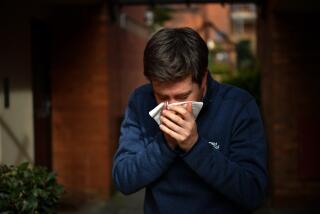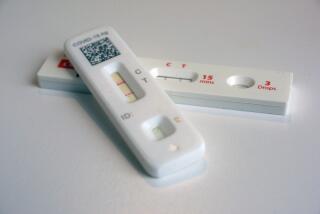A hard-learned lesson about germ warfare
- Share via
They say war is hell, but getting sick is no picnic either. Here’s my briefing:
Two weeks ago I was bivouacked on the sofa around 2200 hours, eating Jell-O pudding, when I detected the first sign of hostile troop movement. Unfortunately, the invaders’ advance party was small and stealthy, and my sentries paid little heed.
I finished the pudding, watched more TV and went to bed around midnight.
As I slept, the enemy massed. By daybreak, I was surrounded. My throat was so sore that it hurt to swallow, my head was stopped up and I was shivering. I called the office, told them I was under siege and taking casualties. A co-worker wished me luck.
In what proved to be a mistake, I did not engage the enemy. Instead, I dived back under the covers around 0900 hours. I remained there for much of the day, allowing the invaders to gain crucial ground. They occupied my head and throat, expelling the small expeditionary force -- a single tablet of ibuprofen -- I belatedly sent to combat them. For the next two days (10-11 January), we played a waiting game.
Because I’m normally impregnable to hostile forces, I didn’t think the attackers could last. Indeed, by Saturday (12 January), I thought they’d been largely vanquished. So sure was I that I made good on a previous invitation to have a friend come over to watch an NFL playoff game and later go to dinner.
With my attention diverted, the enemy regrouped and returned for modest skirmishes later that night and into Sunday (13 January). Weakened but not disabled, I returned to work on 14 January.
Temporarily buoyed at the sight of friendlies in the office, I rebounded. The enemy obviously took note, and in a tactic as old as warfare itself, lulled me into thinking it had retreated. That night (14 January), under the cover of darkness, it marshaled its forces and launched its largest offensive yet.
I’d gone to bed at midnight with my head and throat largely secured. War’s end was in sight, and I was ready to proclaim “Mission Accomplished.” Around 0200 hours, however, the insurgents, disguising their presence, attacked with a vengeance.
A cough that hadn’t been a part of the initial onslaught ripped through me. For two hours in the middle of the night, and with no reinforcements in sight, the enemy laid siege to my chest. A wracking cough, the likes of which I’d not remembered having in years, continued unabated. It forced me to sit up, to stand up, to walk around -- anything but lie down for the sleep I desperately needed.
Disoriented by morning, I came to work a few hours late. That night, seeing that I’d not fortified myself, the enemy attacked again with punishing force. And again for a third consecutive night in the wee hours of 16 January. Whatever ground I’d recovered a few days earlier had been lost.
Still, I came to work on 16 January. Friend Greg confided later that he’d told Friend Vicky that day that he’d never seen me look worse in the 10 years he’d known me.
Seemingly, there was but one way to avert further cataclysmic losses -- a surge.
On 17 January, I went to the doctor. I described my position; he nodded knowingly. He’d seen this before, noting that he’d been working until 8 most evenings because of the glut of cold and flu hitting the county. The attack was classic bronchitis, he said, artfully staged and executed.
He armed me with antibiotics, prescription cough syrup and a coupon good for $2 off an over-the-counter expectorant.
At this writing (1600 hours on 21 January), the surge has been in place for four nights. The enemy appears on the run. The nocturnal cough has disappeared, but its toll can still be felt in my general sense of feeling run-down.
Yet for the first time in 11 days, I feel hope. My troops are in place, finally realizing what they’re up against and taking nothing for granted. The enemy is nowhere in sight. Best of all, I still have half a bottle of syrup and plenty of expectorant.
I’m safe.
At least, that’s what I’m telling myself.
--
Dana Parsons can be reached at (714) 966-7821 or at dana.parsons@latimes.com.
An archive of his recent columns is at www.latimes.com/parsons.
More to Read
Sign up for The Wild
We’ll help you find the best places to hike, bike and run, as well as the perfect silent spots for meditation and yoga.
You may occasionally receive promotional content from the Los Angeles Times.






